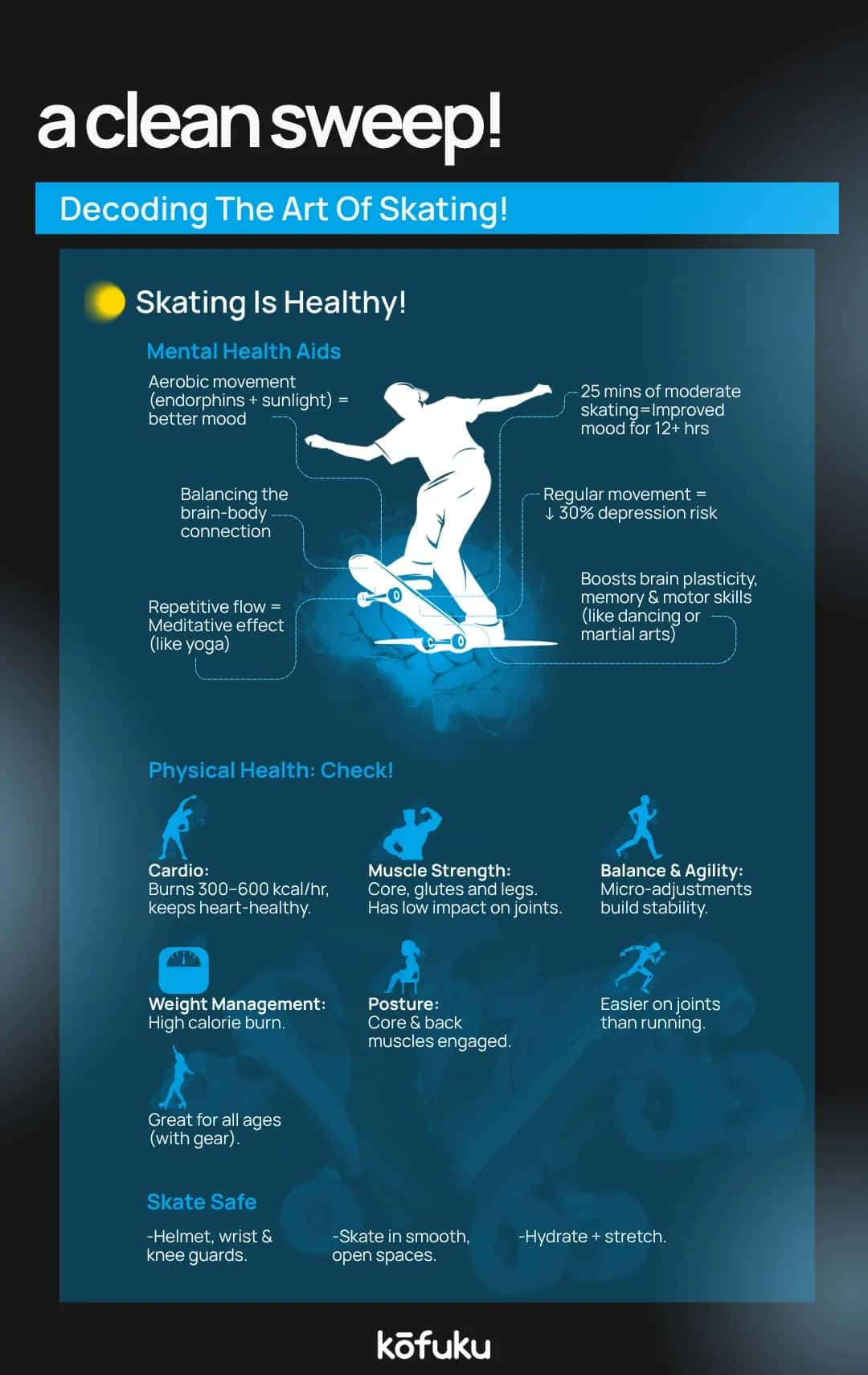Skating and Wellness: How it Enhances the Mind and Body


Introduction
Remember that iconic scene from the Barbie movie where Barbie and Ken are roller-skating along the beach, decked out in neon outfits, effortlessly gliding with the biggest grins on their faces? That moment wasn’t just about fun fashion; it also gave us a glimpse into the pure joy that skating can bring!
Skating, whether done on wheels or blades, does much more than being a fun exercise option. From fitness benefits to mental clarity, skating has more advantages than just a cardio workout.
In this article, we will explore the benefits of skating and why it's one of the best low-impact activities for both your mind and body.
Benefits of Skating
1. Elevates Heart Health and Endurance
Skating is an amazing way to improve your cardiovascular fitness. It gets your heart pumping and your lungs working. Consistent skating increases circulation, improves lung capacity, and increases endurance.
The secret to increasing your stamina over time is 30 minutes to an hour of skating. Sounds pretty simple, right? Skating burns calories at a healthy rate and, therefore, is an excellent way to maintain energy throughout your day.
2. Sharpens Balance and Coordination
When you think about the many advantages of skating, one particularly notable benefit is balance and coordination. Balancing on skates requires both focusing on your posture and alignment.
Each time you glide, turn, or stop, you are doing so based on your proprioception (the body's ability to perceive its relative position in space).
All of this leads to improved balance, coordination, and agility, which is no doubt very useful for your everyday life.
3. Strengthens Your Lower Body
When you skate, every push and every glide engages your leg, core, and glute muscles. You aren't just spinning around in circles, but also training your lower body by using a functional and supported motion.
Over time, you will notice that your thighs, calves and stabilising muscles have all become a little bit stronger.
The controlled push-off and gliding also improve muscular endurance, reducing fatigue during longer skating, walking or running sessions.
4. Improves Mood and Reduces Stress Levels
Benefits of skating aren’t just limited to your physical health. Your mental health improves significantly when you skate. The gliding motion is repetitive and rhythmic, and just like how those centring yoga poses can relieve muscular tension, skating can also help you reduce the stresses of the day.
Although skating is not usually synonymous with 'exercise', it does release endorphins that impact your mood positively and reduce stress levels.
Solo or with friends, skating provides a sense of freedom and connection with movement that helps you unwind. In fact, many skaters report that they feel relaxed and more balanced after skating.

5. Boosts Focus and Mindfulness
Skating is very mindful, you have to pay attention to your surroundings, balance yourself, be aware of the trajectory, patterns of movement, and timing or rhythm.
All of these things keep your attention in the moment and keep it grounded through motion and feedback from your senses.
Many people refer to skating as a type of "moving meditation that helps reduce mental chatter and enhances cognitive function.
6. Supports Weight Management
Skating is an excellent option for those looking for a fun way to manage their weight. It burns calories without heavily impacting your joints, making it a great exercise for everyone, regardless of fitness level.
Regular skating, even 30-60 minutes, a few times a week, can help you be active and, combined with a balanced diet, it creates a calorie deficit to help support weight loss while maintaining muscle.
Skating is a sustainable way to be active and manage your body mass.
7. Flexibility, Agility and Mobility
Skating involves constant shifting of weight, as well as turns and dips. It requires increased flexibility and joint mobility. Your ankles, knees, hips, and core learn to move fluidly and respond dynamically.
Coaches routinely recommend skating for increasing someone's agility. Skating also ensures reduced risk of injury and deals with any issues related to stiffness and immobility.

8. Builds Confidence and Body Awareness
As you skate, you’ll become more confident, gliding further, turning more gracefully, or picking up speed. Working towards these physical milestones builds a positive mindset and develops your body awareness.
The process of learning how to balance, safely stop, and glide with confidence will help you in many other areas of your life while allowing you to develop an overall enhanced sense of control and coordination.
9. Fosters Mental Resilience and Discipline
Skating improves mental resilience and helps you become disciplined, as any new skill needs time and consistency if you want to get good at it.
You also have to be patient when you’re not immediately successful in developing skating skills. There will be challenges that you’ll face with balance, braking, and speed control.
As you progress on this journey, you’ll start to develop new levels of mental toughness, self-discipline, and the ability to push through plateaus.
These soft skills that you develop while skating will be immensely helpful when you move to other sports, career and life goals, or any issues you face in everyday life.
10. Community and Social Engagement
Going to a skating class or a rink helps you to meet new people and provides you with a safe learning environment. Simply chatting while skating, cheerleading others on, or drilling together can help you make life-long relationships with people and contribute to your community.
Conclusion
One of the most beautiful things about skating is its versatility. It’s a low-impact activity that’s gentle on your joints, making it accessible to people of all ages and fitness levels.
Plus, it can be easily adjusted to suit your pace and goals. Every session offers a chance to enjoy movement, stay present, and just have fun. Whether you’re gliding through a sunlit park, cruising indoors at a rink, or simply skating for the sheer joy of it, it's not just another workout; it’s a way of nurturing both your body and mind.

FAQs
Q. How does skating benefit mental health?
A. Skating releases endorphins that help to relieve stress. It also promotes mindfulness and can enhance mood and confidence, ultimately having a positive impact on your mental health.
Q. Is skating effective for weight loss?
A. Definitely, skating can be a healthy and steady way to burn calories and maintain a healthy weight, all while minimising the impact and stress on your joints.
Q. Can skating improve balance and coordination?
A. For sure! Skating enhances proprioception and body control, so you can move more smoothly and coordinate your movements effectively.
Q. What age is ideal to start skating?
A. There isn't a set age for skating. Children can start learning the basics of skating around 4-5 years old, and many adults do just fine picking it up as a beginner.
Q. Are there any risks or precautions with regular skating?
A. You need to take standard safety measures like wearing protective gear, warming up your muscles before skating, and avoiding skating in crowded areas and on uneven surfaces.

Fitness for Older Adults - Mobility and Flexibility

Age Is Not a Limitation for Fitness - Break Limitations

Dancing at Concerts for Fitness – Move and Groove

8 Reasons Why Fitness Is Crucial for Heart Health

Park Gym Equipment: Outdoor Fitness Machines for Public Spaces & Gardens

